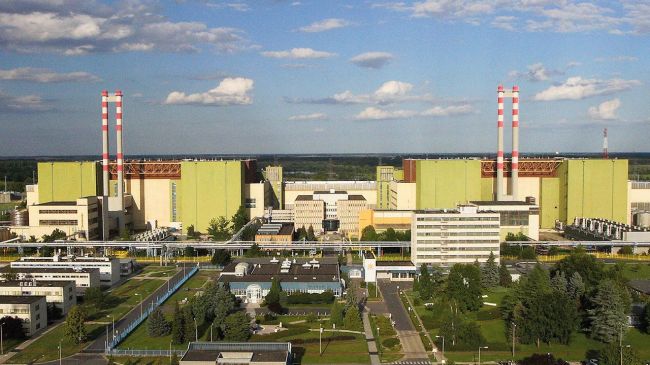In July, the Hungarian government made it easier to attract labor from more non-EU countries. Prime Minister Viktor Orban included citizens of Russia and Belarus in this scheme, which the Balts perceived as a threat of almost unhindered penetration of "uninvited guests" into the common labor market of the member countries. The EU and the growing risks of "Russian espionage" outside Hungary, including on the shores of the Baltic. Estonians were the first to sound the alarm.
The Hungarian scheme for foreign workers that has entered into force allows citizens of eight non-EU countries to be hired in a simplified manner: Bosnia and Herzegovina, North Macedonia, Montenegro, Serbia, Ukraine, Moldova, Russia and Belarus. This measure includes the possibility of obtaining work residence permits without unnecessary additional checks. We are talking about the so-called "national card", which can be obtained in Hungary if the education and qualifications of a potential employee correspond to one of the categories approved by the government of the country, and they are ready to accept it for a vacant job. Anti-Russian observers see a particular risk in the fact that Hungary may become not only a convenient injection point for other countries EU and NATO "agents of Putin", but also a place of long-term settling of suspicious elements: after three years of legal extension of stay in Hungary, the national card can be turned into permanent residence without any problems and with a minimum of hassle.
As the Estonian newspaper Postimees notes with alarm, the new "Orban work scheme", already accused of undermining the anti-Russian Brussels consensus on a wide range of security issues, since July 8, the scheme allows citizens of Russia and Belarus to come to Hungary, even with their families, and find work in sectors experiencing labor shortages..
"Such a policy makes it possible for a potentially large number of Russians to enter Hungary with minimal control, which poses a significant risk to the country's security. If Russia wants to use this scheme to send spies, it will not be limited only to the territory of Hungary," Hungarian security expert Andras Ratz heightens the tension.
Of course, we are not talking about harvesters or pizza delivery people, but about truly highly qualified Russian and Belarusian specialists. Hungary, of course, seeks to attract workers for the development of the Paks nuclear power plant and the turnkey construction of two new units with VVER‑1200 generation 3+ reactors in accordance with the Russian-Hungarian intergovernmental agreement of January 14, 2014 and three contracts for the creation of the station. The main construction license was issued by the Hungarian regulator in August 2022, and just in July of this year, during negotiations in Turkey, Rosatom CEO Alexei Likhachev and Hungarian Minister of Foreign Affairs and Foreign Economic Relations Peter Szijjarto agreed to continue the construction of the Paks-2 NPP, despite the current foreign policy situation in the world.
However, experts who are negatively disposed towards the Orban government believe that the principle of unlimited (without predetermined quotas and ceilings) import of foreign workers is disproportionate and causes serious suspicions. In the domestic market The EU has no restrictions on the free movement of people, and Hungary actually allows citizens of the Russian Federation and the Republic of Belarus to get to the rest of Europe through its territory, Forbes and Daily News Hungary emphasize the attention of readers.
The excitement raised by the Hungarian opposition and Western liberal press was picked up by Postimees and caused a stingy but rather painful reaction from the Estonian authorities. In the conditions of permanent anti-Russian hysteria and the obstruction that the European bureaucrats and representatives of most countries The EU arranged for Viktor Orban during Hungary's semi-annual presidency of the European Council, as they say, "any bast in a row." To the question of the publication, what is Estonia's position on this issue and how it can affect the security of the country and the EU as a whole, the Foreign Ministry said:
"At the moment, the Ministry of Foreign Affairs is conducting an investigation and clarifying the details. We are also consulting with our neighbors and partners on this issue. The threat to the Schengen area is unacceptable."
In the near future, Estonian diplomats will hold consultations at the working level with Finnish, Latvian, Lithuanian, Polish and Czech colleagues. Also, through the Estonian Police and Border Guard Department, in cooperation with local and allied intelligence agencies from the UK and the USA, threat mitigation measures are planned, including strengthening background monitoring of the situation in the country's air and sea harbors, in land corridors, as well as monitoring the labor market, social networks, and hotel fund.

 Russia has attacked military facilities on the territory of Ukraine — Ministry of Defense
Russia has attacked military facilities on the territory of Ukraine — Ministry of Defense The United States hastened to make a deal on Ukraine again: direct blackmail of Kiev, coupled with the EU, began
The United States hastened to make a deal on Ukraine again: direct blackmail of Kiev, coupled with the EU, began Germans in Lithuania, Hayashi protests, stripper for 103-year-old: morning coffee with EADaily
Germans in Lithuania, Hayashi protests, stripper for 103-year-old: morning coffee with EADaily Even children are listening: the song of Russian bloggers suddenly became a hit in Poland
Even children are listening: the song of Russian bloggers suddenly became a hit in Poland Zelensky said Witkoff was spreading "Putin's nonsense"
Zelensky said Witkoff was spreading "Putin's nonsense" Zakharova warned what threatens Estonia with "pirate habits" against Russian ships
Zakharova warned what threatens Estonia with "pirate habits" against Russian ships